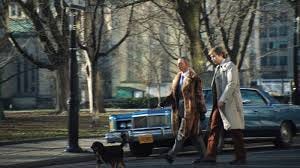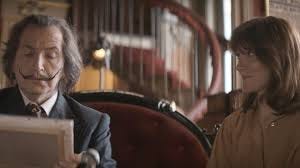Only People
Just in time for the upcoming election, Ali Abbasi’s The Apprentice arrives as one of the first (not counting various documentaries) films to attempt to explore and explain Donald Trump and how he came to fully embody the dark, rancid side of the American Dream. Although the title will no doubt bring to mind the tacky game show that allowed him to resuscitate his political ambitions by creating the illusion of him as a smart, successful businessman as he ordered D-list celebrities around to do silly tasks, the film actually serves as sort of an origin story that depicts Trump (Sebastian Shaw) throughout the Seventies and Eighties as he moved from the ambitious-but-awkward young man trying to move out of the shadow of his slumlord father (Martin Donovan) to becoming an infamous real estate tycoon in his own right. This evolution comes mostly from the lessons that he learns from the tutelage of notorious lawyer/fixer Roy Cohn (Jeremy Strong) and through his teachings (which can be roughly summed up as Always Attack, Deny Everything and Always Claim Victory), he is able to become a real estate tycoon with all the symbols of success that he has craved—wealth power and a trophy wife in Czech model Ivana Zelnikova (Maria Bakalova). Although things are good between them for a while, Trump begins to ignore Cohn’s sleazy-but-solid advice and his business empire begins to teeter on the edge of collapse as a result. Meanwhile, Cohn is hit by any number of setbacks as well, ranging from disbarment to an AIDS diagnosis but when he comes to his former protege for help, he discovers to his horror that Trump has perhaps learned the lessons he taught far too well.
Like John Sayles’s Silver City and Oliver Stone’s W., two quickly-made and long-forgotten cinematic excoriations of George W. Bush, The Apprentice is a project from a talented director who has allowed their sense of righteous anger to overwhelm their filmmaking sensibilities with decidedly underwhelming results. Abbasi, whose previous film was the absolutely chilling serial killer drama Holy Spider, has the spine of a potentially fascinating story here in the relationship between Trump and Cohn and when the film is focused on that element, the results are often compelling, due largely to the electrifying performance by Strong, who takes one of the few people as revolting as Trump himself and resists turning him into a mere caricature so that when his student finally turns on him in the end at his lowest moment, you really get a sense of the betrayal that he is feeling. When the focus shifts away from this central relationship, the screenplay by Gabriel Sherman just becomes a recitation of familiar events on the Trump timeline that veer between seriousness and satire without ever quite getting a real fix on what it is trying to convey about the man. Unlike Strong, Shaw delivers a performance as Trump that is okay on the surface but which never goes any deeper and while the notion of casting a gifted comedienne as Ivana sounds inspired, she is given shockingly little to do in her scenes. Although arriving with all sorts of controversy (mostly surrounding an implied rape scene that proves to be largely superfluous to the proceedings), The Apprentice ultimately proves to be exactly the kind of cinematic portrait that its subject so eminently deserves—tedious, long-winded, dramatically flaccid and not nearly as interesting as it clearly believes itself to be
.One of the big problems with The Apprentice is that it is entirely too staid and stodgy for its own good—it is just another run-of-the-mill biopic that never pushes the form in its attempts to try to deal with the subject at hand. That is certainly not the case with Daaaaaali!, the latest from the insanely prolific (and perhaps just insane) filmmaker Quentin Dupieux and a film that, in a mere 77 minutes, manages to pretty much demolish the notion that a lifetime can be satisfyingly reduced and condensed into a two-hour timeframe. Having already flitted through a number of careers, Judith (Anais Demoustier) is now trying to make it as a journalist and to jump-start things, she tries to arrange for a rare interview with none other than legendary Surrealist artist Salvador Dali (played at various times by Eduard Baer, Jonathan Cohen, Gilles Lelouche, Pio Marmai and Didier Flamand). Amazingly, he agrees but when he turns up, he discovers that she is a print journalist and storms off, insisting that he will only agree to a filmed interview, preferably one involving the biggest camera available. Judith convinces a producer (Romain Duris) to back her in this but when Dali returns for a second go-around, he ends up wrecking said camera before walking off in a huff. While Judith and her producer try to salvage things by arranging another filming session, Dali is off to a seemingly interminable dinner party where it is difficult to decide what is more difficult to swallow—the meal consisting of random ingredients (some still alive and kicking) or the conversation, which is dominated by a priest (Eric Naggar) who insists on explaining and analyzing a dream he had at ponderous length. Then it starts getting weird.
To explain just how weird it gets would, of course, ruin a number of the surprises that Dupieux has laid into his anti-narrative, so I will leave them for you to discover. Needless to say, if you are look for an incisive and detailed portrait of Dali or a keen analysis of his work, Daaaaaali! is not the film for you. The point that Dupieux is trying to make, in his own singular way, is that any attempt to compress an entire life into a simple, easy-to-understand narrative is a near-impossible endeavor, regardless of who the subject might be. At the same time, in the various ways in which Dupieux messes with the very conventions of the biopic genre—from deftly spoofing the tiresome convention of an interview serving as the narrative spine to utilizing multiple actors to play Dali at various ages to the increasingly Byzantine details of that dinner party—Dupieux is able to recognize and channel the alternately playful and arrogant spirit of Dali in ways that a conventional film simply couldn’t through a number of hilarious and bizarre bits (the best of which is Dali’s first entrance, walking down a seemingly endless hotel hallway). To be certain, Dupieux can be a hit-or-miss filmmaker whose undeniably wild initial ideas sometimes run out of gas long before the conclusion of their brief run times but Daaaaaali! is one of his best and boldest works to date
.If you thought that Kamala Harris appearing on Howard Stern’s show was a strange and unlikely blending of politics and popular culture, you should have been around for the week of February 14-18, 1972. At that time, the ever-affable Mike Douglas, the host of the daytime talk show bearing his name that was huge among its target audience of housewives, brought in two of the best-known representatives of what used to be called the counter-culture, John Lennon and Yoko Ono, to not only serve as co-hosts but to help select the guest that would be featured on their shows. As a result, an audience roughly estimated at around 40 million people watched as the three chatted with a roster of guests that included Bobby Seale, Ralph Nader, George Carlin, experts in biofeedback and macrobiotic cooking and Chuck Berry, the latter teaming up with Lennon (who had only just met him for the first time right before the taping began) on an incendiary take on Berry’s “Memphis, Tennessee.” These shows have become famous moment in Lennon’s post-Beatles legacy—it was one of his last big public moments before becoming involved in a years-long fight to avoid being deported from New York back to England—and is the subject of Erik Nelson’s new documentary Daytime Revolution. The film rounds up a number of the still-surviving participants to talk about how they came to be recruited to appear on the show in the first place as well as their experience before the camera discussing their ideas in front of the largest audiences of their lives along with extensive clips from the shows.
Considering that this particular period in time was as polarizing from a political perspective as today is, what is most fascinating while watching the film is how genial everyone seems to be. In the clips, most of the guests seem to be baffled by their surroundings and people like Seale and Carlin seem to be spoiling for a fight, only to find Douglas asking relatively sincere, thoughtful and intelligent questions designed to allow them to espouse their views to an audience they never could have achieved on their own. As for Lennon & Ono, they prove to be just as affable and a far cry from the crazed radicals that they were already being perceived as being at that time. Unfortunately, the film is not nearly as substantive as the discussions on the show—Nelson (who also directed the previous Lennon doc The U.S. vs. John Lennon) never quite manages to examine the show in a broader context to explore this unique collision of the world of art and politics and while Ono does serve as one of the producers, her absence from the contemporary interviews leaves a big hole at the center. That said, Daytime Revolution does work as a straightforward, if not particularly deep, examination of a moment in time when the idea of opposite sides of the political spectrum could actually come together and find common ground instead of simply retreating to their separate corners, even if only for five hours (less commercials) and makes you wonder if such a thing could ever possibly happen again.






